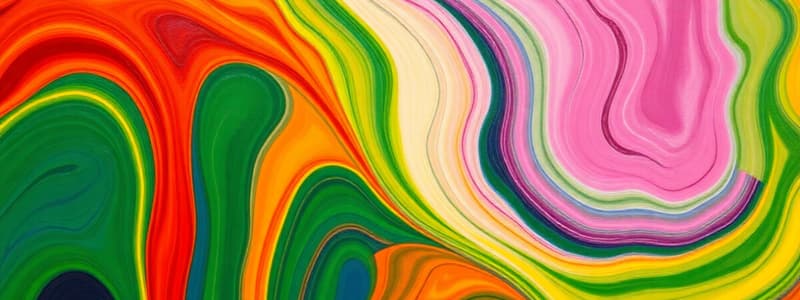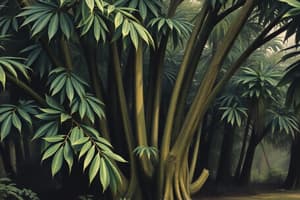Podcast
Questions and Answers
What is the primary role of latex in plants?
What is the primary role of latex in plants?
- To facilitate photosynthesis
- To assist in water absorption
- To protect against injury and deter herbivores (correct)
- To serve as a nutrient source for growth
Which plant is the most significant source of natural latex?
Which plant is the most significant source of natural latex?
- Lagos Rubber (Ficus elastica)
- Para rubber (Hevea brasiliensis) (correct)
- Chicle (Manilkara zapota)
- Gutta-Percha (Palaquium gutta)
What is the primary component of latex?
What is the primary component of latex?
- Polyterpenes (correct)
- Proteins
- Lipids
- Carbohydrates
What process is used to stabilize rubber against temperature changes?
What process is used to stabilize rubber against temperature changes?
What happens to natural rubber when it is heated?
What happens to natural rubber when it is heated?
Where in the Para rubber tree is latex produced?
Where in the Para rubber tree is latex produced?
Which of the following compounds is involved in the vulcanization process?
Which of the following compounds is involved in the vulcanization process?
What characteristic does cured natural rubber exhibit?
What characteristic does cured natural rubber exhibit?
What is a primary use of guayule latex?
What is a primary use of guayule latex?
Which of the following is a characteristic of gutta-percha?
Which of the following is a characteristic of gutta-percha?
What significant role did guayule play during World War II?
What significant role did guayule play during World War II?
What was the main ingredient of commercial chewing gums until the 1960s?
What was the main ingredient of commercial chewing gums until the 1960s?
Which material is a close relative of chicle and produces a non-elastic latex?
Which material is a close relative of chicle and produces a non-elastic latex?
Which property makes gutta-percha suitable for electrical insulation?
Which property makes gutta-percha suitable for electrical insulation?
What prompted the initial use of guayule latex in the 1920s?
What prompted the initial use of guayule latex in the 1920s?
Which of the following statements about chicle is true?
Which of the following statements about chicle is true?
What percent of rubber produced annually comes from natural sources?
What percent of rubber produced annually comes from natural sources?
Which of the following is not a use for natural rubber?
Which of the following is not a use for natural rubber?
Who patented the first practical pneumatic tire?
Who patented the first practical pneumatic tire?
What was the main purpose of the 'Fordlandia' project?
What was the main purpose of the 'Fordlandia' project?
Why did the rubber plantations become prominent in Southeast Asia by the late 1800s?
Why did the rubber plantations become prominent in Southeast Asia by the late 1800s?
What major issue was faced by indigenous rubber tappers in Brazil during the rubber boom?
What major issue was faced by indigenous rubber tappers in Brazil during the rubber boom?
What problem did early waterproofed cloth developed by Charles Macintosh face?
What problem did early waterproofed cloth developed by Charles Macintosh face?
What was a significant drawback of using crude rubber in the 1700s and 1800s?
What was a significant drawback of using crude rubber in the 1700s and 1800s?
What was the role of 'rubber barons' in Manaus during the rubber boom?
What was the role of 'rubber barons' in Manaus during the rubber boom?
Which country is most noted for rubber production in the modern era?
Which country is most noted for rubber production in the modern era?
What historical impact did the Amazonas Opera House have in Manaus?
What historical impact did the Amazonas Opera House have in Manaus?
What technique must be used to ensure the raw latex can be processed into rubber effectively?
What technique must be used to ensure the raw latex can be processed into rubber effectively?
Flashcards
Plant Latex
Plant Latex
A stable emulsion of polyterpenes in water, containing minor components like proteins, alkaloids, and resins.
Polyterpenes
Polyterpenes
Compounds made of repeating isoprene units, carbon chains with single and double bonds.
Para Rubber Tree
Para Rubber Tree
A tree that produces latex in high amounts, used in tire and other product production.
Vulcanization
Vulcanization
Signup and view all the flashcards
Lactifer
Lactifer
Signup and view all the flashcards
Elastomer
Elastomer
Signup and view all the flashcards
Crude Rubber
Crude Rubber
Signup and view all the flashcards
Isoprene
Isoprene
Signup and view all the flashcards
Guayule
Guayule
Signup and view all the flashcards
Para Rubber
Para Rubber
Signup and view all the flashcards
Gutta-percha
Gutta-percha
Signup and view all the flashcards
Chicle
Chicle
Signup and view all the flashcards
Balata
Balata
Signup and view all the flashcards
Hypoallergenic Latex
Hypoallergenic Latex
Signup and view all the flashcards
Latex Substitute
Latex Substitute
Signup and view all the flashcards
Commercial Chewing Gum
Commercial Chewing Gum
Signup and view all the flashcards
Natural Rubber Harvesting
Natural Rubber Harvesting
Signup and view all the flashcards
Rubber Latex
Rubber Latex
Signup and view all the flashcards
Vulcanization
Vulcanization
Signup and view all the flashcards
Rubber Boom
Rubber Boom
Signup and view all the flashcards
Synthetic Rubber
Synthetic Rubber
Signup and view all the flashcards
Pneumatic Tire
Pneumatic Tire
Signup and view all the flashcards
Rubber Plantations
Rubber Plantations
Signup and view all the flashcards
Crude Rubber
Crude Rubber
Signup and view all the flashcards
Forced Labor
Forced Labor
Signup and view all the flashcards
Rubber Tappers
Rubber Tappers
Signup and view all the flashcards
Para Rubber
Para Rubber
Signup and view all the flashcards
Forced labor (1910)
Forced labor (1910)
Signup and view all the flashcards
Hysteresis
Hysteresis
Signup and view all the flashcards
Fordlandia
Fordlandia
Signup and view all the flashcards
Akron, Ohio
Akron, Ohio
Signup and view all the flashcards
Study Notes
Latex Production and Uses
- Plant latex is a water emulsion of polyterpenes, proteins, alkaloids, resins, and gums.
- Polyterpenes are polymers of isoprene units (C₅H₈).
- Latex production is by specialized cells (lactifers) in bark, taproot, or leaves depending on the species.
- Latex protects plants from injury and deters herbivores/pests/pathogens.
- Para rubber, from Hevea brasiliensis, is the most significant latex producer; used for commercial/household products.
Para Rubber (Hevea brasiliensis)
- Native to Amazon rainforest, now mostly from plantations in Southeast Asia/Africa due to diseases.
- Latex is produced in response to wounds in inner bark in right-handed spirals.
- Raw latex is a colloidal suspension of isoprene polymers with impurities.
- Raw rubber is an elastomer, thermoplastic.
Rubber Processing (Vulcanization)
- Vulcanization stabilizes rubber against temp changes by cross-linking isoprene polymers with sulfur/peroxide/bisphenol bonds.
- Vulcanization makes rubber harder, more durable, elastic, and less thermoplastic.
- Carbon black is added to enhance strength and durability.
- Sulfur stabilizes carbon and hydrogen.
Rubber Properties and Applications
- Cured natural rubber stores strain energy electrostatically and thermally via flexibility and resilience qualities; used for tires, elastic bands, etc.
- Synthetic rubber (petroleum-derived) is a substitute/alternative but often inferior.
- Natural rubber accounts for ~40% of global rubber production by source (8.5-9 million tons annually).
- Major production countries include Indonesia, Malaysia, Thailand, and smaller from India, Liberia, Nigeria.
- Diverse applications include hoses, belts, matting, flooring, boots, tires.
Historical Rubber Usage
- Indigenous people of Mesoamerica used crude rubber for games, ball making.
- Indigenous rubber use extended to shoe manufacturing, waterproof materials.
- Rubber was exported to Europe in the 1700s/1800s, causing wealth for barons but not for rubber tappers.
- Rubber extraction from wild trees in South America and other areas, creating products like large balls.
Rubber Innovations and Industries
- Charles Macintosh patented waterproof cloth using rubber in 1823.
- Charles Goodyear discovered vulcanization in 1839. Thomas Hancock patented the same technology soon after.
- Henry Wickham smuggled rubber seeds to break Brazilian monopoly.
- Introduction of rubber plantations in Southeast Asia during the late 1800s.
- King Leopold II used forced labor for rubber extraction in Belgian Congo during early 1900s.
- Henry Ford's Fordlandia project, an attempt to create an American rubber monopoly in Amazonia in early 1900s, failed.
- Pneumatic tires, invented by Dunlop (1888), led to massive increase in rubber demand.
- Akron, Ohio, became a major rubber manufacturing hub, dominating the market for bias-ply tires initially, but was overtaken by European radial tire developments from Michelin in 1946.
Other Important Latex Types
Guayule (Parthenium argentatum)
- Native to southwestern US/northern Mexico.
- Produces hypoallergenic latex, used in medical products for allergy sufferers.
- Significant use in the 1920s and WWII.
Gutta-percha (Palaquium gutta)
- Southeast Asian tropical tree.
- Non-elastic latex, highly resilient/hypoallergenic, and good electrical insulator.
- Used in 1800s: telegraph wires, cables, molded products.
Chicle (Manilkara zapota)
- Central/South American tropical tree, chewed by indigenous cultures for oral hygiene and pleasure.
- Introduced to the US in 1850s, marketed as chewing gum in 1870s.
- Key ingredient for chewing gum until the 1960s.
Balata (Manilkara bidentata)
- Northern South American tropical tree.
- Non-elastic latex, close relative to chicle/gutta-percha.
- Used in golf ball cores.
Studying That Suits You
Use AI to generate personalized quizzes and flashcards to suit your learning preferences.




